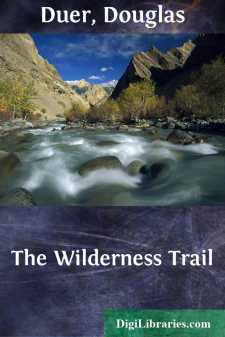Categories
- Antiques & Collectibles 13
- Architecture 36
- Art 48
- Bibles 22
- Biography & Autobiography 813
- Body, Mind & Spirit 142
- Business & Economics 28
- Children's Books 15
- Children's Fiction 12
- Computers 4
- Cooking 94
- Crafts & Hobbies 4
- Drama 346
- Education 46
- Family & Relationships 57
- Fiction 11828
- Games 19
- Gardening 17
- Health & Fitness 34
- History 1377
- House & Home 1
- Humor 147
- Juvenile Fiction 1873
- Juvenile Nonfiction 202
- Language Arts & Disciplines 88
- Law 16
- Literary Collections 686
- Literary Criticism 179
- Mathematics 13
- Medical 41
- Music 40
- Nature 179
- Non-Classifiable 1768
- Performing Arts 7
- Periodicals 1453
- Philosophy 64
- Photography 2
- Poetry 896
- Political Science 203
- Psychology 42
- Reference 154
- Religion 513
- Science 126
- Self-Help 84
- Social Science 81
- Sports & Recreation 34
- Study Aids 3
- Technology & Engineering 59
- Transportation 23
- Travel 463
- True Crime 29
The Wilderness Trail
by: Douglas Duer
Description:
Excerpt
UP FOR JUDGMENT
“And you accuse me of that?”
Donald McTavish glared down into the heavy, ugly face of his superior—a face that concealed behind its mask of dignity emotions as potent and lasting as the northland that bred them.
“I accuse you of nothing.” Fitzpatrick pawed his white beard. “I only know that a great quantity of valuable furs, trapped in your district, have not been turned in to me here at the factory. It is to explain this discrepancy that I have called you down by dogs in the dead of winter. Where are those furs?” He looked up out of the great chair in which he was sitting, and regarded his inferior with cold insolence. For half an hour now, the interview had been in progress, half an hour of shame and dismay for McTavish, and the same amount of satisfaction for the factor.
“I tell you I have no idea where they are,” returned the post captain. “So far as I know, the usual number of pelts have been traded for at the fort. If any have disappeared, it is a matter of the white trappers and the Indians, not my affair.”
“Yes,” agreed the other suavely; “but who is in charge of Fort Dickey?”
“I am.”
“Then, how can you say it is not your affair when the Company is losing twenty thousand pounds a year from your district?”
The young man ground his teeth helplessly, torn between the desire to throttle ugly old Fitzpatrick where he sat, or to turn on his heel, and walk out without another word. He did neither. Either would have been disastrous, as he well knew. He had not come up three years with the spring brigade from the Dickey and Lake Bolsover without knowing the autocratic, almost royal, rule of old Angus. Fitzpatrick, factor at Fort Severn for these two decades.
So, now, he choked back his wrath, and walked quietly up and down, pondering what to do. The room was square, low, and heavily raftered. Donald had to duck his head for one particular beam at each passage back and forth. Beneath his feet were great bearskins in profusion; a moose's head decorated one end of the place. The furniture was heavy and home-made.
At last, he turned upon the factor.
“Look here!” he said simply. “What have you got against me? You know as well as I do that there isn't another man in your whole district you would call in from a winter post to accuse in this way. What have I done? How have I failed in my duty? Have I taken advantage of my position as the chief commissioner's son?”
Fitzpatrick pawed his beard again, and shot a sharp, inquisitive glance at the young captain. That mention of his father's position was slightly untoward. In turn, he pondered a minute.
“Up to this time,” he said at last, “you have done your work well. You know the business pretty thoroughly, and your Indians seem to be contented. I have nothing against you—”
“No,” burst out McTavish, “you have nothing against me. That's just it. Virtues with you are always negative; never have I heard you grant a positive quality in all the time I have known you....






